|
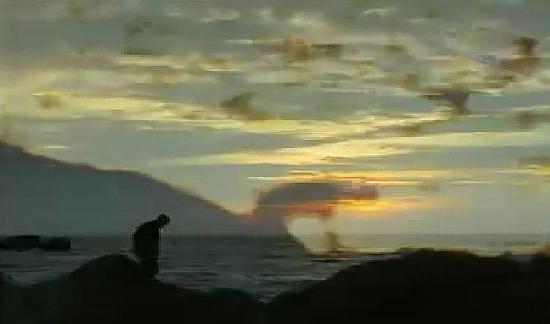
Polis is This
Charles Olson & the Persistence of Place
in six parts
_______________________
Hume's diffuse effects
Simon Blackburn
David Hume was born 300 years ago this month. Prompted by the anniversary, many philosophers worldwide will be reflecting on his great works. In the UK this comes at a cost, since doing so deflects us from scrambling to find activities with more immediate and measurable "impact". We can nevertheless find a kind of justification in his writings.
Speaking of the different species of philosophy, in the first part of his Enquiry Concerning Human Understanding (1748), he wrote that "though a philosopher may live remote from business, the genius of philosophy, if carefully cultivated by several, must gradually diffuse itself throughout the whole society, and bestow a similar correctness on every art and calling".
I find it interesting that it is the idea of diffusion that appealed to him here. It did so to George Eliot, too, when in the wonderful final sentence of Middlemarch (1874), she contrasted Dorothea's quiet future with the idealistic visions of doing good with which she had started life: "But the effect of her being on those around her was incalculably diffusive: for the growing good of the world is partly dependent on unhistoric acts, and that things are not so ill with you and me as they might have been, is half owing to the number who lived faithfully a hidden life, and rest in unvisited tombs."
Incalculably diffusive processes are real enough. Education is one of them. ...(more)
via Siris
_______________________

Sasha Terebenin
via Poemas del rķo Wang
_______________________
The Death of the Book
Ben Ehrenreich
Los Angeles Review of Books
(....)
None of this is new of course. Nor is it new to point out that people have been diagnosing—and celebrating—the book’s imminent demise for generations. It is possible to regard much of Western avant garde poetry and prose as an extended argument with the bound pages from which literature would prefer to break free. In a 1913 manifesto, Filippo Marinetti (a futurist of the OG sort) called for “a typographic revolution directed against the idiotic and nauseating concepts of the outdated and conventional book.” His insurrectionary program may now seem quaint—“on the same page we will use three or four colors of ink, or even twenty typefaces if necessary”—but Marinetti was not alone in rebelling against the uniformity imposed on language by the standard typeset page. Similar urges ran through most of the high modernists, certainly through Stein, Joyce, and Pound, and through the iconoclastic American poet and journalist Robert Carlton Brown (better known as Bob), who, in the late 1920s, envisioned a reading machine designed to liberate words from the static confines of the page. Brown imagined something like a desk-sized microfiche reader capable of displaying spooled celluloid texts called “readies.” ”Writing has been bottled up in books since the start,” he wrote. ”It is time to pull out the stopper.”
(....)
It is perhaps a symptom of print’s decline that the current conversation about the book’s demise has forgotten all these other ones. Instead we shuttle between two equally hollow poles: goofball digital boosterism a la Negroponte on one side and on the other a helpless, anguished nostalgia for the good old days of papercuts. Call it bibilionecrophilia: the retreat of the print-faithful into a sort of autistic fetishization of the book-as-object—as if Jeff Bezos could be convinced to lay e-profits aside by recalling for a moment the soft, woody aroma of a yellow-paged Grove Press paperback; as if there were nothing more to books than paper, ink, and glue.
For the record, my own loyalties are uncomplicated. I adore few humans more than I love books. I make no promises, but I do not expect to purchase a Kindle or a Nook or any of their offspring. I hope to keep bringing home bound paper books until my shelves snap from their weight, until there is no room in my apartment for a bed or a couch or another human being, until the floorboards collapse and my eyes blur to dim. But the book, bless it, is not a simple thing.
Nor, as we know it, is it particularly venerable. ...(more)
Los Angeles Review of Bookstemporary home_______________________
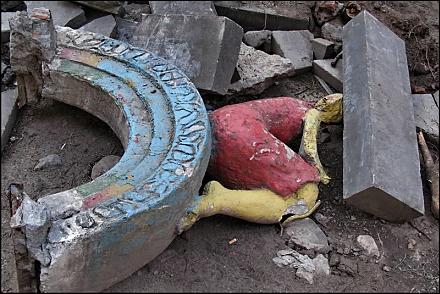
Sasha Terebenin
_______________________
For Tristan Tzara
Bernard Bador
Translated by Clayton Eshleman
The Jivin' Ladybug
Tzara is not dead—only pretends to be, and on This
I will once more erect my eclipse.
Tombs remain the best mail slots for our fugues on
that menstrual flood where Moses drifted
between two buoyed nipples
among the reeds of the Pharaoh,
that embalmer of honeymoons and pickled egos.
The moon repeats its palatial belch
transmitting the old hieroscratched code of heliotropic
priests, sullen lickers of baby scarabs.
Quite a few Dada wars ago
a whole new gang of rich Romans attempting
to surpass the frog, trying to grow larger
than the bull’s-eye bull, suckled
she-wolf udder and deified the milk.
...(more)
The Jivin' Ladybug
A Skewered Journal of the Arts
_______________________
An index of everything published so far in Jacket2
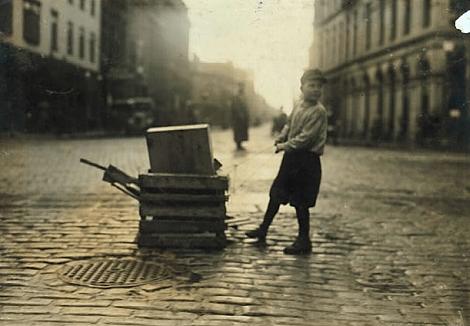
wood scavenger
Lewis Hine
Child Labor Collection LOC
_______________________
Archiving Is The New Folk Art
Kenneth Goldsmith
(....)
Like quilting, archiving employs the obsessive stitching together of many small found pieces into a larger vision, a personal attempt at ordering a chaotic world. It’s not such a far leap from the quiltmaker to the stamp collector or book collector. Walter Benjamin, an obsessive collector himself, wrote about the close connection between collecting and making in his essay “Unpacking My Library”: “Among children, collecting is only one process of renewal; other processes are the painting of objects, the cutting out of figures, the application of decals — the whole range of childlike modes of acquisition, from touching things to giving them names.” In Benjaminan terms, all of these impulses — making, collecting & archiving — can be construed as folk practices.
Let’s add to that the organizing of digital materials. The advent of digital culture has turned each one of us into an unwitting archivist. From the moment we used the “save as” command when composing electronic documents, our archival impulses began. “Save as” is a command that implies replication; and replication requires more complex archival considerations: where do I store the copy? Where is the original saved? What is the relationship between the two? Do I archive them both or do I delete the original?...(more)
_______________________
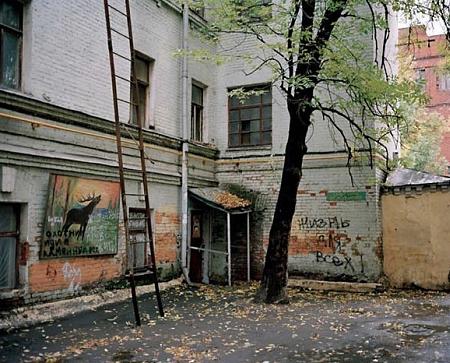
Moscow back yard
Places, strange and quiet
Wim Wenders
via Junk for Code
_______________________
Wittgenstein's Dream
Peter Porter
I had taken my boat out on the fiord,
I get so dreadfully morose at five,
I went in and put Nature on my hatstand
And considering the Sinking of the Eveninglands
And laughed at what translation may contrive
And worked at mathematics and was bored.
There was fire above, the sun in its descent,
There were letters there whose words seemed scarcely cooked,
There was speech and decency and utter terror,
In twice four hundred pages just one error
In everything I ever wrote - I looked
In meaning for whatever wasn't meant.
Some amateur was killing Schubert dead,
Some of the pains of the English force on me,
Somewhere with cow-bells Austria exists,
But then I saw the gods pin up their lists
But was not on them - we live stupidly
But are redeemed by what cannot be said.
Perhaps a language has been made which works,
Perhaps it's tension in the cinema,
Perhaps 'perhaps' is an inventive word,
A sort of self-intending thing, a bird,
A problem for an architect, a star,
A plan to save Vienna from the Turks.
After dinner I read myself to sleep,
After which I dreamt the Eastern Front
After an exchange of howitzers,
The Angel of Death was taking what was hers,
The finger missed me but the guns still grunt
The syntax of the real, the rules they keep.
And then I woke in my own corner bed
And turned away and cried into the wall
And cursed the world which Mozart had to leave.
I heard a voice which told me not to grieve,
I heard myself. 'Tell them', I said to all,
'I've had a wonderful life. I'm dead.'

Ludwig Wittgenstein
b. April 26, 1889
rowing from Skjolden to his house
Ludwig Wittgenstein: A Biographical Sketch
"You must always be puzzled by mental illness. The thing I would dread most, if I became mentally ill, would be your adopting a common sense attitude; that you could take it for granted that I was deluded."
- Wittgenstein
Tom Clark's variously illustrated Wittgenstein posts
_______________________
The Honesty of the Perplexed: Derrida and Ibn 'Arabi on "Bewilderment"
Ian Almond
ifile pdf
Bewilderment takes place when we realize that our rational faculties are not enough to understand what is happening. That something has taken place in a language our rational faculties do not speak. In a sense, bewilderment takes place because of our rationality, because we insist on clinging to something that is blinding us to the "actual situation". What is to be examined in this study is a certain desire for bewilderment in both deconstructive and Sufi thought, a certain perception of bewilderment as a more honest possibility of truth. Words such as perplexity and bewilderment enable us to glimpse a similar vein of thought in both Derrida and the Sufi mystical thinker Ibn 'Arabi (1165 - 1240) - that is, a similar affirmation of confusion as a difficult, courageous, and desirable state.
_______________________

photo - mw
_______________________
English
Yusef Komunyakaa
(....)
From my window, I saw the stars
burning in the river brighter than a big
celebration. I waited for her return,
with my hands over my mouth.
I can’t say her name, because it was
dangerous in our house so close to the water.
Was she a boy’s make-believe friend
or a beehive breathing inside the walls?
Years later my aunts said two German soldiers
shot the girl one night beside the Vistula.
This is how I learned your language.
It was long ago. It was springtime.
-
In memory of Andrzei Ciecwierz
...(more)
Gulf Coast Issue 23.2
via
_______________________

photo - mw

disturbed nestbuilder
photo - mw
_______________________
from Unusual Woods
Gene Tanta
for Paul Celan
Your father died of typhus, they shot your mother
by by rounded lamplight as mortuary dominoes
were calling out an august winter,
your name after dark
little by little
as in a far away mirror.
We all die alone, charred as wildlife pelts.
At night, lightning flashes its teeth
over the Seine.
When the whole city is asleep,
I look over the edge
and I feel
unworthy to cultivate the tongue-black waters.
............
(turn) in the fast darkness of ancient forests,
shadows cross our dreaming faces (turn)
in the movies, an oak tree is always more there
after it’s gone (turn)
this way, a saw emphasizes one thing (turn)
formalwear, night fog rolling in
dressing the silver-blown accessories
(turn) in the morning,
when the rain goes to work,
the cemetery trees shade the cemetery dead
and spiders (turn) play the harps of corners
when the wind sighs, weathercocks turn
to look for a reason (turn)
...(more)
Almost Island
Unusual Woods
Gene Tanta BlazeVOX
_______________________
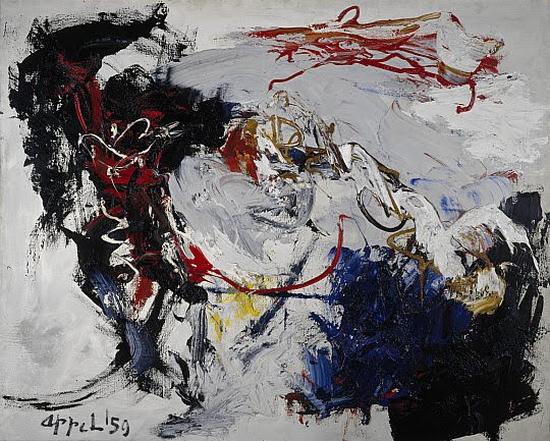 Dance in Space before the Storm
Karel Appel
1959
_______________________
Eine Kleine Nachtmusik
Peter Porter
1929 - 2010
When you have lost whatever there is to lose
You will come to the House of Tatterdemalion Proofs
Where reality is always adjacent itself
And words are at war with their subjunctives –
Alas, you recognize the mildewed Classics,
Blake’s Sunflower stranded, Cherubino’s hair on fire,
A pair of gloves for clapping the great aria.
How many of these doors have the partygoers knocked at?
Is 210, ajar, waiting to receive someone
Or is it the cupboard where the cleaners keep their dreams?
The carpet in the corridor is on Red Alert.
An official of the Surreal Inspectorate
Is interrogating guests downstairs: do you now
Or have you ever belonged to the Accumulative Party?
Life enlarges any neat Divertimento,
So things terrible and beautiful are reborn
Of their own volition; existence may become
A shabby house in a lost Chicago street,
But you cannot dream it otherwise – the lines
Are drawn and the bombardment starts:
Do not wake us yet, our rage must run.
Celebrating the Collected Poems of Peter Porter
John Kinsella
_______________________
The Best of Joe Bageant
ColdType
The Reader Issue 55 April 2011 features a tribute to Joe Bageant
_______________________
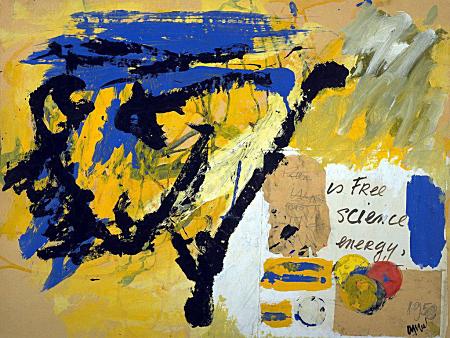
Energy
1950
Karel Appel
b. April 25, 1921
_______________________
Kenneth Goldsmith interview
frieze
Ubu is terrible on every level. There should be hundreds of UbuWebs out there. Why am I the only one? Actually, I know why – because I’m not afraid of copyright and they all are.
(....)
It’s about divided attention as a new strategy of attention. I’m not being a cyber-futurist, every idea here can be found in the 20th century history of avant-garde art. Whether it’s concrete poetry and the web or split screens and divided attention coming from Warhol, that’s what Ubu’s all about.
All of that, which was pushed aside in favour of Picasso and the MoMA narrative of 20th-century art is now back with a revenge informing us how to interact with the web and how to be digital. It’s all there. As much as I love Picasso, Les Demoiselles D’Avignon (1907) is not going to tell us anything on how to live in the world today. The point I want to make is how prescient the ephemeral avant-garde was to the way we are today.
...(more)
Epiphanies: Kenneth Goldsmith(....)It’s all about quantity. Just like you, I’m drowning in my riches. I’ve got more music on my drives than I’ll ever be able to listen to in the next ten lifetimes. As a matter of fact, records that I’ve been craving for years (such as the complete recordings of Jean Cocteau, which we just posted on Ubu) are languishing unlistened-to. I’ll never get to them either, because I’m more interested in the hunt than I am in the prey. The minute I get something, I just crave more. And so something has really changed – and I think this is the real epiphany: the ways in which culture is distributed have become profoundly more intriguing than the cultural artifact itself. What we’ve experienced is an inversion of consumption, one in which we’ve come to prefer the acts of acquisition over that which we are acquiring, the bottles over the wine....(more)
_______________________
According to research (PDF) carried out by Michael I. Norton of Harvard Business School and Dan Ariely of Duke University, and flagged by Paul Kedrosky at the Infectious Greed blog, 92 percent of Americans would choose to live in a society with far less income disparity than the US, choosing Sweden's model over that of the US.
What's more, the study's authors say that this applies to people of all income levels and all political leanings: The poor and the rich, Democrats and Republicans are all equally likely to choose the Swedish model.
-
alternet
Building a Better America - One Quintile at a Time [pdf]
_______________________
Treasure Hunt
Alain de Botton
lapham's quarterly
However powerful our technology and complex our corporations, the most remarkable feature of the modern working world may in the end be the widely held belief that our work should make us happy.
_______________________
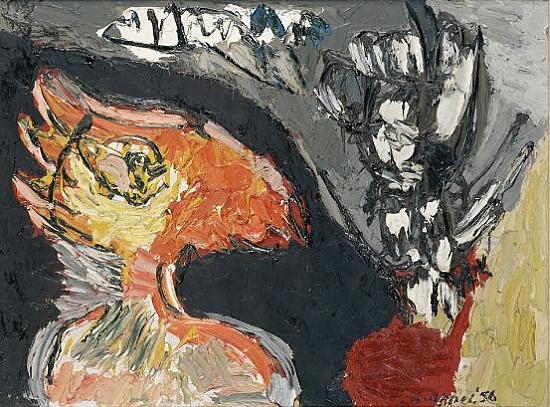
Moonbird
Karel Appel
1956
_______________________
The Bookshelf: You Are What You Speak.
languagehat reviews Robert Lane Greene's You Are What You Speak: Grammar Grouches, Language Laws, and the Politics of Identity
_______________________
Peter Porter at Poetry International Web
This page insists that I explain myself
my poems are over-structured, I am told
but I’m only making good use of my brain
the letters I send you never say
what I want to say, but does it matter
since I write to you concerning me
I let these poems fill-in the proper forms
space is tight, rectangles
for iambs, occasionally trochees
keeping rhythm steady on its feet
but somebody says to be serious
is the way to control your poems – Frost,
Edward Thomas, Elizabeth Bishop, Graves –
always out there on the track
audiences cheering them on forever
the loneliness of the long-dictioned rhymer
dining out with novelists and critics –
consider what happens when our words
become professional – literature
forgets it’s feudal, its narrow kingdom
of palaces and prayer-wheels
...(more)

Joseph Mallord William Turner
b. April 23, 1775
_______________________
The Book of Equanimity Verses
Richard Von Sturmer
Eight verses from a hundred verse sequence, inspired by The Book of Equanimity, a Zen Buddhist collection of one hundred koans.
(....)
When the Castle of Desire
finally crumbles
a forgotten road
takes you into the mountains.
Don’t bother to look back
as you begin to ascend:
the tea houses are vacant
the border post deserted.
The blue hulled tugboat
adds its blue
to the waves.
How difficult it is
to release one’s grip.
Tourniquet, bandages,
bed pans – all receding
in the receding tide.
...(more)
The International Literary Quarterly
_______________________
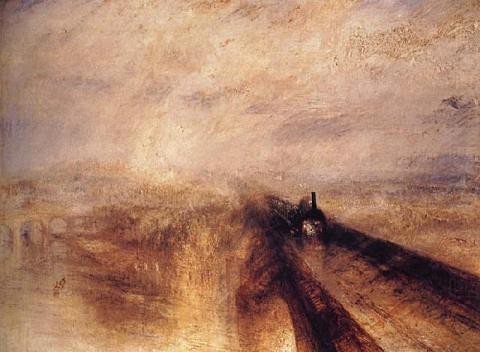
Rain, Steam and Speed
the great western railway
Joseph Mallord William Turner
_______________________
Ars Nova
Maurice Blanchot
Translated by Donald Schier
Perspectives of New Music (Spring - Summer, 1979)
ifile pdf
(....)The fragmentary work-the need of the work itself to be fragmentary-then has a very different meaning depending on whether the work appears as a renunciation of the act of composition, i.e., an aggressive imitation of pre-musical language, (such as expressionism tried to achieve through refinement) or whether it appears as the pursuit of a new form of writing which makes the completed work difficult, not because it evades being finished but because -beyond the conception of the work as being unified and enclosed in itself, organizing and dominating values being transmitted by traditional skills-, this kind of writing explores the infinite space of the work with inexorable rigor yet is based on a new postulate which is that the relationship of the work will not necessarily satisfy the concepts of unity, coherence and continuity. The problem posed by the fragmented work is a problem of extreme maturity; first in artists but also in societies. Walter Benjamin remarks that, in the history of art, last works tend to be catastrophes: "With the great masters, finished works weigh less heavily than those fragments on which they worked all their lives. They draw their magic circle in the fragmentary work." Why? Because the work against which they measure themselves cannot evoke in them a total response, or rather because the artist must find a beginning when the "composition" itself is in some sense already finished; this leaves him only the pain of apparently self-defeating work, the agony of a dislocation which is meaningless only because it continues to promise meaning or is refractory to the order of meaning.
I should like with these remarks to put an end to a misunderstanding by recalling that if there is an essential difference between art and culture, it is not that art is retrograde, that is turned towards an uncultured primitiveness or that it is tempted by nostalgia for an originally natural harmony; the difference exists because art has always gone beyond all acquired forms of culture, to the point that it might better be called post-cultural. What frightens Thomas Mann in the Ars nova (and frightened the masters of the Third Reich no less, since they made haste to proscribe atonal works, preferring to atonalism an esthetic of grandeur, of monumentality and pretentious accomplishment) is indeed frightening through the unending demand which the artistic experience makes on us; and this experience can be realized in fragmentaryw orks because they are enough, by their very existence, to undermine the whole future of culture and any utopia based on happy reconciliation.
(....)
_______________________
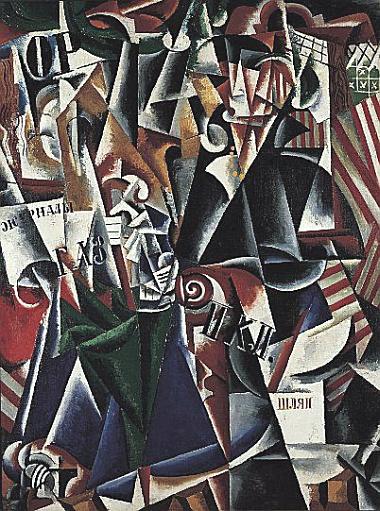
The Traveler
1915
Liubov Popova
b. April 24, 1889
_______________________
SCEPSI - European School of Social Imagination
Conference 20-22 May 2011, Republic of San Marino
Reinventing the autonomy of knowledge is the task of our time. It’s not only a political task. The epistemic foundation of research and learning as autonomous activities is at stake, when dogmas of profit, growth, competition take the lead in the old institutions of production and transmission of knowledge.
This is why we are calling students and researchers, artists and scientists and social activists to gather in the first conference of SCEPSI that will take place in San Marino, on May 20, 21 and 22.
Protests against the financial aggression and the destruction of the public school in the European continent are spreading, but we have to create new institutions, aimed to self organization of cognitive workers and to the reactivation of social sensibility and imagination.
The conference will be the first act of the activity of the European School of Social Imagination, that in the next year will organize seminars in San Marino, and in European cities like Helsinki, London, and Oslo....(more)
.....................................................
One apparently must go to San Marino to find people talking about something worthwhile. Of course we USians gave up the autonomy of knowledge early on - was it at the time we decided that all speech should be impregnated by advertising? Or was it endemic to our method of escaping history -- making all speech, all public records, merely somebody else's marketing, to which we triumphantly suggest our counter-marketing?
If Europe is concerned for the destruction of the public school, it is now in need of referring to our history.
- Tom Matrullo
_______________________
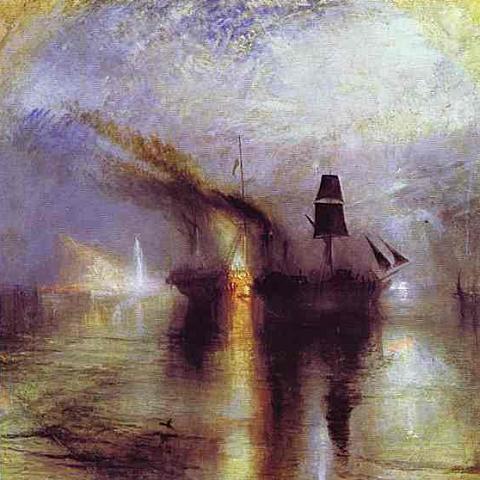
Peace - Burial at Sea
Joseph Mallord William Turner

The Angel of Destiny
Odilon Redon
1840 – 1916
_______________________
Gondwana
Nathaniel Tarn
Here, now, as ever, going out again
from Finis Terre, final of earth, or
“end of world” as they call it here,
all consumption left behind.
The earth fragments – first the big islands,
cannot be told from earth, then
smaller and smaller islands among
their channels, trees grabbing soil
with weaker roots, until all’s rock where
unimagination starts, where
tempests flare around the dreaded horn.
The last inhabitants’ blazing canoes
expose their nakedness to the last explorers.
This plot begins and ends with past.
But what we name the future follows on.
¶
The earth sinks into mind
sea being mind of the earth
in constant movement, constant fretting,
endlessly jumping from thought to thought,
waves rolling in from the planet’s belt
to greet each other as far-flung kin.
Deep in each trough, thriving unseen,
beasts huge as obsessions, beasts
small as secrets; beasts with invading arms
long as your most fearsome nightmares.
...(more)
Nathaniel Tarn at PennSound
A hole torn in the world (PoemTalk #42)
Nathaniel Tarn, "Unravelling / Shock"
jacket2
discussed by Marcella Durand, Burt Kimmelman, Erin Gautsche, and PoemTalk's producer and host, Al Filreis.
A Multitude of One: Celebrating Nathaniel Tarn Edited by
Shamoon Zamir jacket 39
The Embattled Lyric: essays and conversations in poetics and anthropology
Nathaniel Tarn
google books
Selected Poems: 1950-2000
Nathaniel Tarn google books
_______________________

Buddah in His Youth
Odilon Redon
circa 1904
_______________________
Book of the Forest Path
A New Rendition of the Tao Te Ching
Crispin Sartwell
21
A path through the forest
is merely where the trees aren't:
a clearing or absence.
What is it? Where is it?
These are not exactly the right questions;
it is an absence in space
that is also the way you are going.
It is surrounded by trees;
if it had a nature, that would be it:
the stuff all around it that touches
and shapes the emptiness within it.
But that's where you move, isn't it?
That's how and where you go.
It is a useful emptiness, an effective absence.
You've never left it, even if you think you have,
and everything you've seen, you've seen from it.
I know it because here I am.
...(more)
_______________________
The Plot to Turn On the World:
The Leary/Ginsberg Acid Conspiracy
Steve Silberman interviews Peter Conners, author of White Hand Society: The Psychedelic Partnership of Timothy Leary & Allen Ginsberg
(....)The spectacular rise and fall of Leary and Ginsberg’s plot to turn on the world is the subject of a new book by Peter Conners called White Hand Society, published by City Lights Books. I knew Ginsberg well for 20 years and was his teaching assistant at Naropa, a Buddhist university in Colorado, yet I learned a lot about Ginsberg’s role in helping to create Leary’s public identity by reading the book, which is based mostly on the lively correspondence between the two men. (For more detailed analysis of White Hand Society, see this insightful review [pdf] by poet, Buddhist student, and Ginsberg scholar Marc Olmsted.) I spoke with Conners when he came through San Francisco on his book tour. He is currently at work on an oral history of the jam-band scene called JAMerica....(more)
_______________________
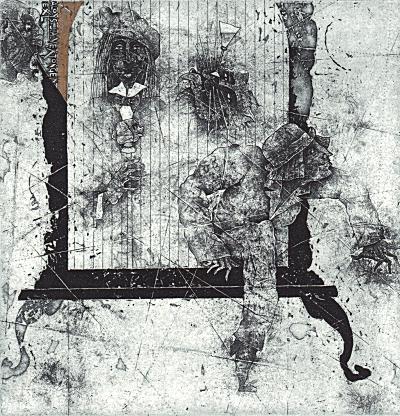
The Master and Margarita
Bookplates by Vladimir Zuev
From the collection of Richard Sica
50 Watts
_______________________
Canada's Military Industrial Complex
Ottawa's Complicity in the Multibillion Dollar Arms Trade
Richard Sanders
Global Research, April 21, 2011
Stoking the Tsunamis of War and Repression
Finally, after years of delays and just a few hours after Japan’s horrifying earthquake on March 11, the government finally released its latest deeply-flawed report on Canada’s military exports between 2007 and 2009. This timing ensured that the latest data on Canada’s shameful role in the international weapons trade was conveniently buried beneath a tsunami of news about Japan’s natural catastrophe.
Corporate media institutions have not deigned to report on Canada’s new arms-export figures, let alone expose how the government’s report covers up far more than it reveals.
Although Canada’s top military-industry association states that Canadian companies exported $15 Billion in so-called “defence” and “security” products between 2007 and 2009, the government’s extremely-limited report accounted for less than $1.5 Billion during that period.
Despite massive loopholes in the government’s report, their data does reveal that almost all of Canada’s military exports went straight into the arsenals of about 40 belligerent nations fighting in the Iraq and/or Afghan wars, which have killed over 1.5 million people.
Although reprehensible, the highly-profitable business of fuelling war has been conducted with impunity by all Liberal and Conservative governments. And, because this trade in arms contributes to a virtual tidal wave of war, repression and environmental destruction, it is arguably even more disturbing than Japan’s natural catastrophe.
But what makes the arms-trade tsunami more horrifying than an earthquake, is that the misery it creates cannot be explained away as a natural disaster beyond human control.
On the contrary, the arms trade – as our government proudly explains – is "closely controlled" using “policy guidelines mandated by Cabinet."
This is the real horror veiled by the latest dry, statistical report from the Department of Foreign Affairs and International Trade (DFAIT) on Canada’s big business of war-industry exports.
But Canada’s arms trade is not just monitored, administered and controlled by DFAIT, it is applauded and promoted by our government. As DFAIT explains, with its usual penchant for euphemism, “Canada's defence industry makes a valuable contribution to the nation's prosperity.”...(more)
_______________________
 kennardphillipps
Ambrose Bierce
(1842-1913)
Devil's Dictionary
illustrated at Weimar
Corporation, n.
An ingenious device for obtaining individual profit without individual responsibility.
_______________________
Interview: John Emerson
I don't think positive or scientistic economics is salvageable. I think that economics should intellectually be like history (i.e. eclectic), and professionally like law: a mercenary profession, but with some thinkers who are not merely doing tasks for people with money. It will never be purer than law and shouldn't be. Note that I don't understand economics: I watch what it does. I'm more knowledgeable about philosophy, in my own way, but with enormous gaps. I have no illusions that I'm a better philosopher than the average PhD. I'm just a mostly-outside critic who dislikes a lot of what they do and how they work.
John Emerson blogs at Haquelebac
_______________________
Foraging for Wood on the Mountain
Jack Gilbert
The wild up here is not creatures, wooded,
tangled wild. It is absence wild.
Barren, empty, stone wild. Worn-away wild.
Only the smell of weeds and hot air.
But a place where differences are clear.
Between the mind’s severity and its harshness.
Between honesty and the failure of belief.
A man said no person is educated who knows
only one language, for he cannot distinguish
between his thought and the English version.
Up here he is translated to a place where it is
possible to discriminate between age and sorrow.
via arsvitaest
Jack Gilbert, The Art of Poetry No. 91
Interviewed by Sarah Fay paris review
Jack Gilbert at the Poetry Foundation
_______________________

Flower Clouds
Odilon Redon
circa 1903

photo - mw
_______________________
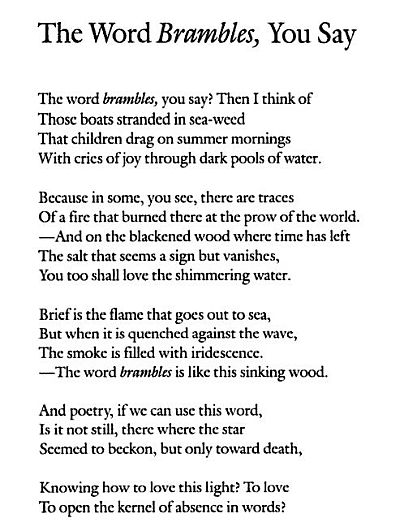
In the Shadow's Light
Yves Bonnefoy
translated by John Naughton
google books
_______________________

photo - mw
_______________________
Poems from Gramina. Marginalia to Horace, Virgil and Dante
Bo Carpelan
(1926-2011)
Translated by David McDuff
Books from Finland
Autumn walk
Bo Carpelan
A man walks through the wood
one day of shifting light.
Encounters few people,
stops, considers the autumn sky.
He is making for the graveyard
and no one is following him.
Coolness and warmth
Michel Ekman on Bo Carpelan
(....)
In Gramina Carpelan derives inspiration from Horace, Virgil and Dante, and he comments on their work in lyrical form. ‘Gramina’ is Latin for grass, and it can be interpreted in various ways: as the poet’s own poems, sprouting among the tall classics of antiquity; or as the vitality which in Carpelan’s poetry always survives, beyond the passage of time and great events:
The grass passes over the earth,
over the gentle hills,
over the silent graves,
stops at the sea and sees
waves, as if they stood still.
For Carpelan the classics are at once contemporary, timeless and the way to a distant past. This is reflected in his poetic approach, which may equally adopt the baneful social criticism of Horace, the brutality of Virgil’s battle scenes, or the basic existential questions of Dante.
Gramina is a commentary on some of the greatest poets of world literature, and it provokes a desire to return to them. But the collection is much more than this: the numerous short poems, many of them consisting of only a few lines, gradually grow into a mighty whole. Most of Bo Carpelan’s major themes – time, memory, perception, the ‘you’ addressed in the poem – undergo further variation here, and acquire new life in language. In a fleeting world Carpelan helps us – just as Horace did two thousand years ago – to preserve something of what is essential....(more)
_______________________
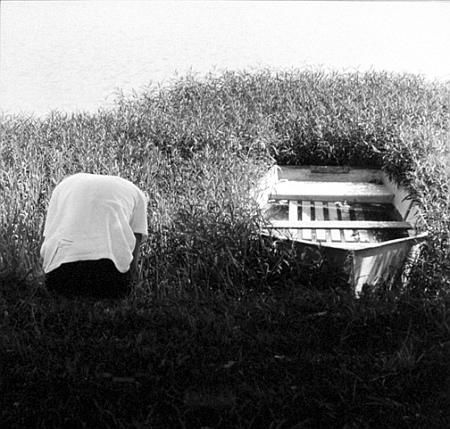
Ralph Eugene Meatyard _______________________
Yves Bonnefoy at Poetry International Web
from
The House Where I Was Born
Translated by John T. Naughton
In the same dream
I am lying in the hollow of a boat,
My forehead and eyes against the curved planks
Where I can hear the undercurrents
Striking the bottom of the boat.
All at once, the prow rises up,
And I think that we’ve come to the estuary,
But I keep my eyes against the wood
That smells of tar and glue.
Too vast, too luminous the images
That I have gathered in my sleep.
Why rediscover, outside,
The things that words tell me of,
But without convincing me,
I desire a higher or less somber shore.
And yet I give up this ground that stirs
Beneath the body waking to itself, I get up,
I go from room to room in the house,
They are endless now,
I can hear the cries of voices behind doors,
I am seized by these sorrows that knock
Against the ruined casings, I hurry on,
The lingering night is too heavy for me,
Frightened, I go into a room cluttered with desks,
Look, I’m told, this was your classroom,
See on the walls the first images you looked at,
Look, the tree, look, there, the yelping dog,
And the geography map on the yellow wall,
This fading of names and forms,
This effacing of mountains and rivers
By the whiteness that freezes language.
Look, this was your only book. The Isis of the plaster
On the wall of this room, which is pealing away,
Never had, nor ever will have anything other
To open for you, to close on you.
...(more)
‘A way among the words’: intimacy, desire and communication in the poetics and poetry of Yves Bonnefoy Judith Bishop jacket 14
Yves Bonnefoy, The Art of Poetry No. 69
Interviewed by Shusha Guppy paris review
A Selection of Poems in Translation [pdf] Translated by Mark Daniel Cohen Hyperion
_______________________

photo - mw
_______________________
In the Vestibule, in the Barn, in the Hayloft, in the Forest with the Planetesimals
Dara Wier
boston review
We give one another things to do.
We give one another thoughts to think.
Thinking About Things‚ Telling You About Them
The dark side of story telling began in 1806 with an elk hunting party gone bad.
(....)
It Is Sometimes the Case that the Difficulty Is What Is Alluring
When we say all is right with the world‚ when we say we are one with the world‚ when
we are lost in the words‚ when we lose ourselves‚ when we casually stand around in air
we feel or don’t feel but know is the seamless same fabric of being that is skimming the
top of water and unbrokenly there is nowhere where nothing is & nowhere where the
removing of something doesn’t rearrange everything; partly it is the difficulty of this that
is so alluring; knowing while we are conscious there is no way or where to disappear into
a fracture or fissure or crack or rent or slash or canyon of otherwise being part of the
whole of it all which is everything and everything there is.
...(more)
National Poetry Month at the Boston Review
_______________________
O bittersweet black sheep:
rob mclennan on Camille Martin's Sonnets

Oregon Clearcut
Proud New Future
Phil Underdown
via ordinary finds
_______________________
Going Up, Falling Down
The Death and Life of Great New York Novels
Tom LeClair
electronic book review
(....)
Gertrude Stein said the United States is the oldest country in the world because it was the first to enter the twentieth century, the modern age. In their disorienting scale and hybrid complexity, cities were postmodern before postmodernism. Cities defamiliarize, provide cognitive dissonance, furnish new information and resist interpretation of that information. If a city is too easy or too familiar, we lose interest. The city becomes a simple story or a strip map. Or, to use Jacobs' phrase, the city suffers the "Great Blight of Dullness."
It has been my argument that the best individual novels should have the postmodern qualities of cities, should be cities of words. Lethem and O'Neill are just not adequate to the complexity of their subjects. DeLillo's two novels are intentionally self-limiting. Although The Intuitionist and Let the Great World Spin are historical novels, in their information and methods they do the best at imitating the distinctive space and specifying the diverse demographics of New York City.
And yet I think these two novels fall short of the master works of the 70s and 80s with which I began.(....)
More disturbing than the well-known situation of commercial publishing is the possibility that the cost of living in New York discourages resident novelists from risking lengthy, time-consuming projects. The future of intellectually and aesthetically ambitious fiction is a huge and complex subject involving conglomerate publishing, new media, text technology, literary education, and literacy itself. That future is global, but I've come to believe that New York may well be the representative leading - and double - edge. New York nourishes home-grown writers such as Lethem and Whitehead, attracts writers from abroad such as O'Neill and McCann, and honors its elder, DeLillo. New York offers the eight million stories of the naked city and makes a few writers millions, but I fear that New York also tamps down novelists' aesthetic ambitions, turns them into careerists of modest, consumable art - not minimalism or maximalism but medianism - that will allow them to continue publishing in and maybe living in Cosmopolis.
Brooklyn resident Paul Auster, with his bi-annual turning of the crank, is probably the best-known representative of this market-savvy medianism....(more)
_______________________

The King’s Jester
Joan Miró
1926
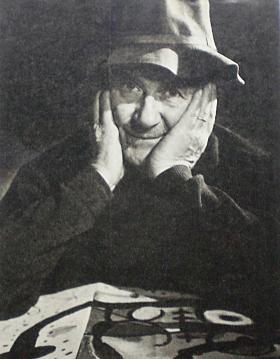
Joan Miró
b. April 20, 1893
_______________________
Signs and Symptoms
Robert Gal
translated from the Slovak by Charles Sabatos
exquisite corpse
(....)
II
In the reflection of the water-mirror the surface of translucence points to its hidden elemental nature. Memory is in the trace of reflections which we conceal like one and the same jewel. Its strangeness is a boomerang.
(....)
VI
We blush with the truths, which -- like the bitter spit of defiance -- we expel from our mouths. What relation does the truth of pain have to the truth of logical legalities? And who is the arbiter to pass judgment on our argument? (Who actually judges whom, and on what grounds? To what extent is it acceptable for us to consider an argument incomparable?)
A sketch of an answer: the truth of pain is the truth of time. All other truths are timeless truths, thus from the standpoint of everyday life, they are insubstantial.
We explore this first truth in pain; its measure is the measure of feeling it, while those others are mostly bounded by a system of artificial criteria, created by humankind in a state of undisturbed contemplation.
This is, of course, a schema. Nothing is as far from contemplation as plainness is from physiological laws. Nothing is further from pain than the ignorance of various ideas about its "worth" or "value" . . .
Actually, only a single truth goes through time untainted: the truth of which time itself has not even brushed in passing.
...(more)
_______________________
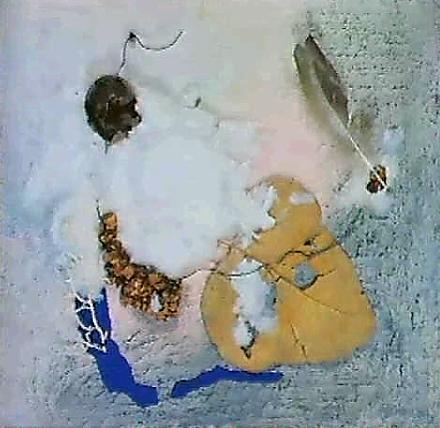
Enrico Prampolini
b. April 20, 1894
_______________________
The Mood of Agoraphobia
Dylan Trigg
(....)... Turning back to [composer Allen] Shawn’s account of walking down an empty road, then what we find is that a particular localised part of the body—in this case, the legs—becomes the focal point of an existential struggle: “I couldn’t seem to get past the point at which I would be closer to the destination than to the point of origin …. I was convinced that when I reached the midpoint, my legs would not move at all and that I would be trapped in place there. I had a vivid picture of myself standing at the centre of emptiness, screaming”. This focused intentionality—what Merleau-Ponty calls “pain-infested space”—is only possible against a larger backdrop, of which mood is the foundation. Mood is the context in which the phobic’s bodily sensations are able to take place, and those sensations spring from the pervasive grip the mood has upon lived experience....(more)
_______________________

Communicating
Jon Edwards
_______________________
The Blog as Mask and Gravestone
Justin E. H. Smith
(....)
I have confusedly tumbled over divers authors in our libraries, with small profit for want of art, order, memory, judgment. I never travelled but in map or card, in which my unconfined thoughts have freely expatiated, as having ever been especially delighted with the study of cosmography… A mere spectator of other men’s fortunes and adventures, and how they act their parts, which methinks are diversely presented unto me, as from a common theatre or scene.
Burton loved the world, though he knew it almost entirely through the books he kept in his cell. While at nearly the same moment in European history, Burton’s contemporaries, such as René Descartes, were denouncing ‘book learning’ as inauthentic, as an impediment to true knowledge, Burton reminds us, as Gass so well understands of his predecessor, that whether out in the world or locked in our cell, it is the human mind that is doing most of the work of experience anyway; a rich, full life may be led with only the most two-dimensional of stimuli to carry it along. The Anatomy of Melancholy is proof of this.
Today, too, the Internet can seem an impediment to many of what are thought to be our more authentic experiences. But it may also be facilitating the sort of experience we have always had, qua human beings, experience based in love, and that can be had just as intensely in virtual form (letters from friends, books about nature, the Internet), as in ‘reality’ (seeing friends face-to-face, going camping). Sometimes I imagine I am feeling a love of the world as strong as Burton’s when I click, say, on a link from the Wikipedia entry on the Finno-Ugric languages to the entry on the Samoyed people of the Russian Arctic, and from there to the entry, written in Samoyed, on reindeer. There is so much out there, and it’s all in here!
True enough, in here, in this hyperlinked, screen-shaped reproduction of the world, what we find for the most part is a great mess “of barbarism, Doric dialect, extemporanean style, tautologies, apish imitation, a rhapsody of rags gathered together from several dung-hills, excrements of authors, toys and fopperies confusedly tumbled out, wihout art, invention, judgment, wit, learning, harsh, indigested, vain, scurrile, idle, dull, and dry.” But this is nothing new, and as Burton shows, it is the variety stacked upon variety, and the detail squeezed between details, the inexhaustible proliferation of adjectives, that makes this whole mess a mirror of human ingenium.
...(more)
_______________________
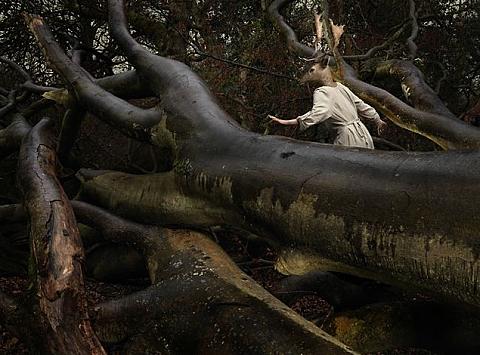
Julia Fullerton-Batten
via (OvO)
_______________________
An identity in relation
Anne Tardos on absence
Kit Robinson
jacket2
Grief is the most deeply personal condition, and yet it is also the most universal, extending even beyond human experience to the animal kingdom. To write out of grief is equally to find a way out of it. In the curious case of Anne Tardos’s I Am You, it is also to affirm loss as foundational, or rather to affirm that there is no foundation, to affirm that the removal of the other by whom one’s life has been shaped and sustained reveals an emptiness at the very root of existence.
As the Buddhists say, there is no foundation, but something is always given. Or as Anne Tardos writes: “I try and make good use of what life throws at me”.
I Am You is not so much a tale of grief as it is a record of the process of emergence from grief into new life. Tardos writes:
At first it’s the death you need to deal with
That incomprehensible act
It’s all fine and good for you to be dead, but how am I going to carry you about?
In a series of outbursts — cantankerous, humorous, loving, detached, foolish — Tardos delineates her experience of a return to life three years after the death of her husband, the poet Jackson Mac Low. Each statement is surrounded by white space — on the page, in time, of the mind — a blankness that gives birth to the occasion of the present moment and then withdraws it just as fast as the eye follows, the voice changes, and the hand turns the page. ...(more)
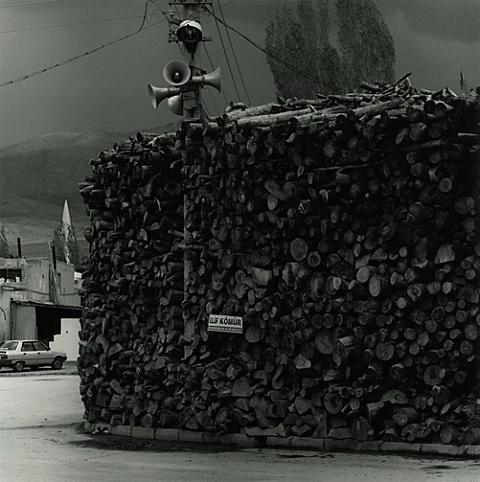
Gonzalo Echeverria M/C Journal
Vol. 14, No. 1 (2011)
'doubt'
with photographs by Gonzalo Echeverria
Pragmatist Doubt, Dogmatism and Bullshit
David Macarthur .....................................................
A Plea for Doubt in the Subjectivity of Method
Elisabeth Hanscombe
Doubt has been my closest companion for several years as I struggle to make sense of certain hidden events from within my family's history. The actual nature of such events, although now lost to us, can nevertheless be explored through the distorting lens of memory and academic research. I base such explorations in part on my intuition and sensitivity to emotional experience, which are inevitably riddled with doubt. I write from the position of a psychoanalytic psychologist who is also a creative writer and my doubts increase further when I use the autobiographical impulse as a driving force.
I am not alone with such uncertainties....(more)
Elisabeth Hanscombe's blog
_______________________

Experiential Typography
One Day Poem Pavilion
Jiyeon Song
via Poets and Writers Picnic
_______________________
Nohow On: Company, Ill Seen Ill Said, Worstward Ho
Samuel Beckett
seedy
from Company
(....)You are an old man plodding along a narrow country road. You have been out since break of day and now it is evening. Sole sound in the silence your footfalls. Rather sole sounds for they vary from one to the next. You listen to each one and add it in your mind to the growing sum of those that went before. You halt with bowed head on the verge of the ditch and convert into yards. On the basis now of two steps per yard. So many since dawn to add to yesterday's. To yesteryear's. To yesteryears'. Days other than today and so akin. The giant tot in miles. In leagues. How often round the earth already. Halted too at your elbow during these computations your father's shade. In his old tramping rags. Finally on side by side from nought anew.
The voice comes to him now from one quarter and now from another. Now faint from afar and now a murmur in his ear. In the course of a single sentence it may change place and tone. Thus for example clear from above his upturned face, You first saw the light at Easter and now. Then a murmur in his ear, You are on your back in the dark. Or of course vice versa. Another trait its long silences when he dare almost hope it is at an end. Thus to take the same example clear from above his upturned face, You first saw the light of day the day Christ died and now. Then long after on his nascent hope the murmur, You are on your back in the dark. Or of course vice versa.
Another trait its repetitiousness. Repeatedly with only minor variants the same bygone. As if willing him by this dint to make it his. To confess, Yes I remember. Perhaps even to have a voice. To murmur, Yes I remember. What an addition to company that would be! A voice in the first person singular. Murmuring now and then, Yes I remember.
(....) _______________________
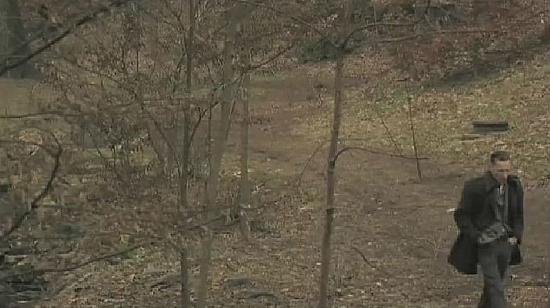
Interstates and States of Grief
Phil Rockstroh
video by Angela Tyler-Rockstroh
(....)Traveling U.S. interstate highways one suffers a confluence of so much contemporary madness and tragedy extant in the land … so much suppressed fear and aggression. Yet, through it all, the heart still yearns to see what lies over the next horizon.
Although, lamentably, what is revealed, all too often, proves to be as sterile, inhospitable, ugly, and inhuman as what was beheld at the last.
"Who has twisted us around like this, so that no matter what we do, we are in the posture of someone going away?" -- Rainer Maria Rilke
Any situation, as is the case with interstate highway travel, in which to momentarily stop or even to slow down, one risks death should be regarded as an affront (if not anathema) to common sense and the longings of the heart.
When the landscape we pass through has been reduced to a meaningless blur, our lives grow indistinct as well.
...(more)
_______________________
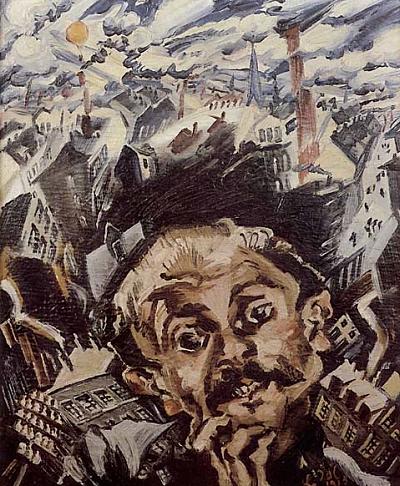
I and the city
1913
Ludwig Meidner
b. April 18, 1884
_______________________
Crickets
Ian Goodale
conjunctions
(....)Of those without fault to the brain-bearing faculty little can be said, as they were, as a general rule of their hospitalized existence (but further cloistered by their seemingly inherent secretiveness) entirely silent when confronted with query or commendation, criticism or careless remark: the unknowable creatures lurking beneath the collective consciousness of the building’s staff and other inhabitants, dreamlike phantasms without a veritable self nature of their own grasp or comprehension, to say nothing of their non-existence in the minds of those about them.
Those with the horizon-curved hoods of white, however, were a rather active contingent of the ward’s population, as well as the largest segment of the unit as a whole’s social makeup: their lips would often quiver with the anticipatory chatter of persons bored by a semi-enforced silence, angering their sole keeper and sending her rushing about in an attempt to quell the sudden, unpredictable upsurges of cacophonous conversation, glib exchanges of varying topics and emotional registers. And yet the inevitable result of all of her tireless efforts towards a maintaining of calm muteness in the ward was a return to the beginning of the ordeal, the inception of the illicit interruption of tranquil air, accomplished through the impetuous utterances that so vibrated and disturbed the once-waveless inlet of empty space; so the nurse of our initial concern would abandon her post as guardian of the group altogether, marching briskly from the hangar of the sickly and installing herself in the ever-empty storage room at the termination of the narrow hall, the housing of the cordoned kingdom of her protection and alleged authority....(more)
_______________________
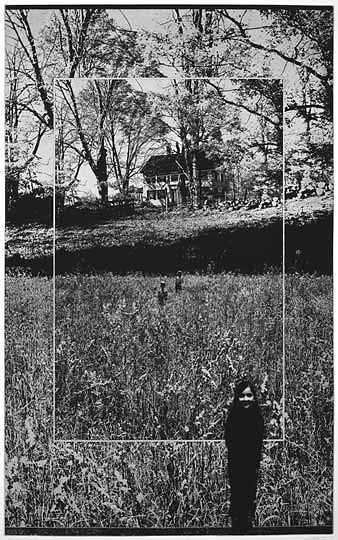
April's August
Peter Milton
1975
_______________________
Transfigured
Cathal ŅSearcaigh
I am getting ready to become a tree,
not because some god is after me,
bearing down with his aerial authority,
my heart bolting from the thrust of his need.
My figure will be transfigured, in one go;
my human shell turned to the trunk of an oak,
my skin twisted to gnarled bark, my blood-flow
to sap. Out of my branch-bones leaves will grow.
Already, my fingers and toes are stretching out,
elongating into sinewy roots,
tucking themselves tightly into the ground;
and when a breeze blows my branches round,
I feel as if I’m going nuts, or out
of my tree. Today I stand tall and straight,
not breathing but rustling; birds congregate
in me, warbling airs while I create
chlorophyll, inspired by unfathomable light
to fulfil my destiny, synthesise my fate.
Twenty-two Irish and Scottish Gaelic Poems, Translations and Artworks
An Leabhar Mņr - The Great Book of Gaelic
a special presentation of Archipelago
An Leabhar Mņr / The Great Book of Gaelic is an international collaborative artwork bringing together the work of more than 200 visual artists, poets and calligraphers from Scotland and Ireland. It has generated an international touring exhibition of 100 artworks, a book publication, a television documentary, a series of BBC radio programmes, a music CD, a schools pack and an events programme. Following the exhibition tour (until 2008) the artworks will be bound into one volume to form a visual anthology and a permanent visitor attraction.
_______________________

The Garden (Second State)
Peter Milton
1968
_______________________
The Late Age of Print
Everyday Book Culture From Consumerism to Control
Ted Striphas
(....)I’m neither prepared to write an elegy for printed books, nor am I pre- pared to make the claim that little has changed—or should have changed— in the cultures of books over the past twenty-five, fifty, hundred, or five hundred years. I genuinely value books, especially printed ones. I’m surrounded by them as I write these words. Nevertheless, the purpose of The Late Age of Print isn’t to make a fetish of books. A substantial number of books about books have been published over the last decade or so, many of which rhapsodize about book collecting and care, the inveterate passion for reading, the wonder of libraries and bookstores, the highs imparted by the smell and texture of printed books—in a word, what Nicholas A. Basbanes admiringly calls “bibliomania.” This book isn’t one of them, at least not in any straightforward way. Singularly affirmative narratives about books, though often personally moving and poetic, can obscure book history’s more sinister side. One person’s bibliomania often depends indirectly on the exploitation of another’s labor. It may also depend on potentially damaging forms of social and epistemological exclusion that flow from privileging the printed word over other, more fully embodied forms of expression.
By the same token, I’m not cynical enough to suggest that printed books are anachronisms whose longevity only hampers our achieving a sublime digital future. Anachronisms aren’t things. They’re performative utterances whose force empowers people to sidestep difficult questions about the being of time and to install themselves as gatekeepers of temporal propriety. Hence, there are no anachronisms, only ways of seeing things as anachronisms. Whenever common sense tells us that printed books are dusty holdovers from the pre-electronic, analog era, we would do well to change our frame of reference. Books are artifacts with a deep and abiding history that belong in and to our own age—no more and no less so than flat-screen televisions, MP3 players, computers, and other so-called cutting-edge technologies. via Dialogic
_______________________
'disaster capitalism' surges on
The half-life of disaster
Brian Massumi
Of course, nothing can ever expunge the horror. It will be archived. The images of the disaster will be held indefinitely in store. For as long as there is an internet, they will remain available for recirculation. It is not so much that the horror is replaced by human warmth and its accompaniments. It is rather that it "decays" in the media. The horror transmutes into a different affective element, its intensity halved, then halved again, eventually reducing to trace levels. Globally, the event settles back into a more stable range of the periodic table of collective emotion.
What is the half-life of disaster in today's global media? At most two weeks. The suffering on the ground continues, and will continue for decades. World attention quickly shifts elsewhere....(more)
|

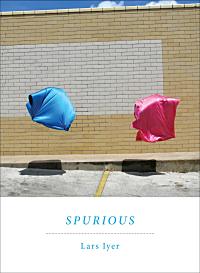


 The Age of Briggs & Stratton
The Age of Briggs & Stratton




































